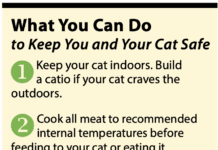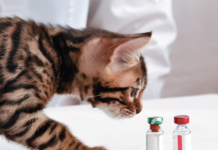When it comes to decisions about vaccinations for chronically ill, skinny, debilitated cats, consider these facts:
- No solid research answers the question about whether to vaccinate ill cats.
- The existing vaccination guidelines do not address cats by age once they are adults.
- The diseases these vaccinations prevent are far worse than any concerns about safety, side effects, or over-vaccination.
- The strength of the cat’s own immune system wanes with advancing age.
“It is important that geriatric cats receive vaccinations,” says Dr. Russell Katz, Cornell Class of 1988 and owner of Pelham Animal Hospital in Pelham, N.Y. “They may have reduced immunity, especially to the respiratory viruses. It’s no different than how important it is for elderly people to receive influenza and pneumonia vaccines.”
Individualized Recommendations
“Unless the kitty has a fever or is receiving treatment for life-threatening diseases, I recommend they be vaccinated for rabies and the feline respiratory complex diseases,” says Dr. Katz. “If they go outdoors, I also recommend feline leukemia virus (FeLV) vaccination for my geriatric feline patients.”
Things your veterinarian will take into consideration when developing a personalized vaccination plan for your geriatric cat include:
- Likelihood of exposure to disease.
- Indoor-only vs. indoor/outdoor. Indoor-only cats are not likely to be exposed to FeLV, but they could encounter respiratory viruses, even when visiting the veterinary clinic. Cats who go outdoors definitely have risk of exposure to FeLV.
- Single-cat vs. multiple-cat home. Cats who live with many other cats have a higher likelihood of exposure to disease and may experience immune-suppressive stress, depending on social dynamics and how the group gets along. Single cats have much lower likelihood of these risk factors.
- New cats introduced frequently. Cats living with families that acquire multiple pet cats or that foster rescue cats have a much higher likelihood of disease exposure and immune-suppressive stress.
- Severity of the disease if infected. For old, skinny, debilitated cats, the consequences of a respiratory infection could be severe.
- Concurrent illnesses. Cats with fevers or severe illnesses are typically not vaccinated until they recover.
- History of adverse reaction to vaccine. If your cat ever suffered a severe reaction, like anaphylaxis, to a vaccine, you and your veterinarian may think twice about repeating this vaccine. If the risk of the disease is high enough to warrant vaccination, pre-treatment with an antihistamine and a corticosteroid 20 to 30 minutes before vaccination is recommended.
Rabies Is a Standout
The rabies vaccine lives in a category all its own. Because rabies is a zoonotic life-threatening hazard to humans, vaccination is heavily dictated by state and/or local municipalities. As such, except for extreme circumstances, the rabies vaccine is generally recommended for all cats, indoor and outdoor.
If your cat shouldn’t receive a rabies vaccine for health reasons (severe anaphylactic reaction in the past, immune-mediated disease making vaccination potentially dangerous, severely debilitated condition), some municipalities will accept a letter from your veterinarian stating why it is dangerous for your cat to be vaccinated and allow an exemption. It may be worth a try, but you will need your veterinarian’s support on this.
If you are avoiding rabies vaccination for your cat but want to know your cat has protective immunity, rabies titer tests are available. Note: The titer test is not accepted by law enforcement, so if your cat bites someone or encounters a rabies-positive bat or other animal, he or she will be considered unvaccinated.ν
The AAHA/AAFP Guidelines
Most veterinarians use the American Animal Hospital Association/American Association of Feline Practitioners Vaccination Guidelines to determine which vaccinations to recommend to their clients. The key word here is “guideline.” These are recommendations for deciding the best course of action for an individual cat. This is not the same as a rule, which is a hard directive with no room for interpretation, or a law, which is government mandated, as is the case with rabies vaccines in many municipalities.
The AAHA/AAFP vaccine guidelines specify which vaccines are considered “core” vaccines—the ones generally recommended for all cats—and “non-core” vaccines, which are given depending upon your cat’s lifestyle and environment. Most people leave the decision to the discretion of the veterinarian.




